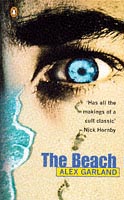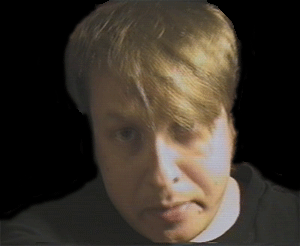
"There's this saying: in an all-blue world, colour doesn't exist. It makes a lot of sense to me. If something seems strange, you question it: but if the outside world is too distant to use as a comparison, then nothing seems strange. Why would I question it anyway? Assimilating myself was the most natural thing in the world. I'd been doing it ever since I became a traveller. Another saying: when in Rome, do as the Romans. In the traveller's ten commandments, that's commandment number one. You don't march into Hindu temples and start saying, 'Why are you worshipping a cow?' You look around, take on board, adjust, accept."
- Alex Garland: The Beach, p. 116
Alex Garland's book The Beach (1997) has been compared to William Golding's Lord of the Flies, and Francis Ford Coppola's film Apocalypse Now is quoted there too. Young Richard is a traveller obsessed by video games and Vietnam movies who hears while in Thailand from a man who calls himself Daffy Duck (and who soon after commits suicide) of a perfect beach, yet unspoiled by tourists. Together with his new companions, French Étienne and his girlfriend Françoise, Richard embarks on a journey to this hidden seaside paradise, which we gradually find out, hosts more snakes that one would like first to believe... the other side of island is inhabited by a rogue gang of armed criminals who tend a plantation of marijuana there; and hiding behind a waterfall there is a hippie-like commune of travellers from around the world who want to keep their resort secret at any cost possible. Richard, Étienne and Françoise make home in the commune and new friends with black British Keaty, the cook Unhygienix and the mysterious Jed, to find eventually out the place has its dark secrets. Daffy Duck returns to haunt Richard as a ghost/hallucination/figment of his imagination/fantasy/dream, and violence finally roars its ugly head. Before that nature has also shown its scary power, with deadly shark attacks on the dwellers of camp.
It's obvious that Alex Garland is a gifted writer of great promise, even though I found the middle section of book too prolonged, and the events there unfolding a bit too slow for my tastes, with too much pedestrian material left in, but the devastating ending of the book was gladly more than rewarding. Richard is one complex and ambiguous piece of work, who seems live more than half in the world of fantasy of his own head, and more often than once the reader stops to wonder if he's just plain schizophrenic.
There's also a watered-down film version (2000) of this book by Danny "Trainspotting" Boyle, which was turned into a Leonardo DiCaprio vehicle I recommend you to gracefully forget: a pity since this book has all the makings of great film, perhaps in the style of John Boorman's Deliverance. The producers messed up with the book's structure all the way, turning the British Richard into a Yank (DiCaprio), and making the book's baddies, a scheming couple Sal and Bugs who head the commune, in their turn, from Americans in the book to the film's British. Richard's romance with Françoise is never actually consummated in the book, but with the romantic roles Leonardo DiCaprio is known, this happens in the film, Richard/DiCaprio also having briefly an illicit flung with Sal (in the film played by Tilda Swinton). (And the silliest of all, Keaty's obsession has been turned from Nintendo to cricket!) Also the film's ending is far less dramatic and gory than in the original book, and many important characters and scenes are dropped away. Read the book, skip the biopic.


No comments:
Post a Comment